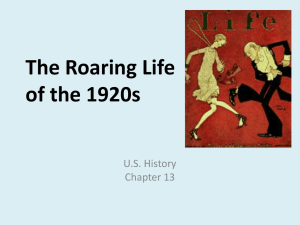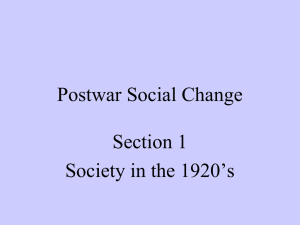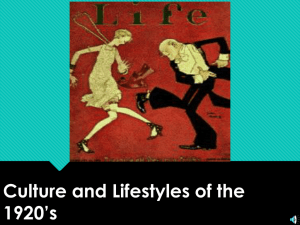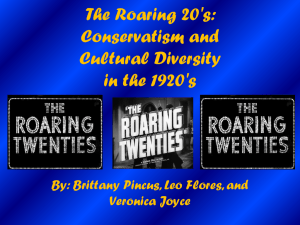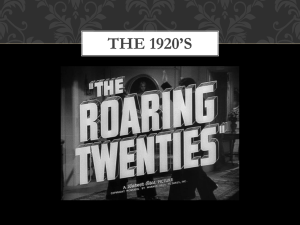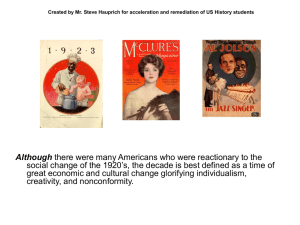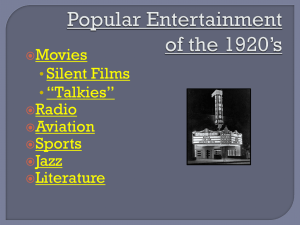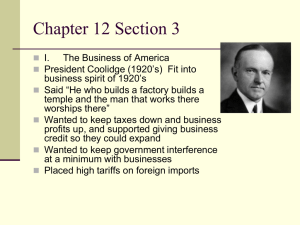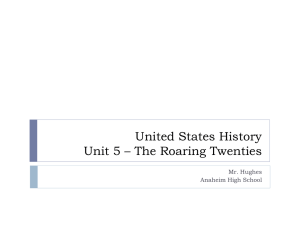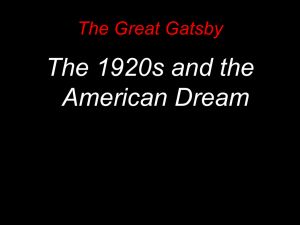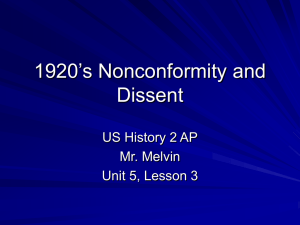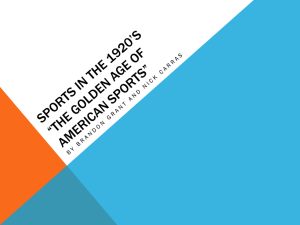Chapter 11
advertisement
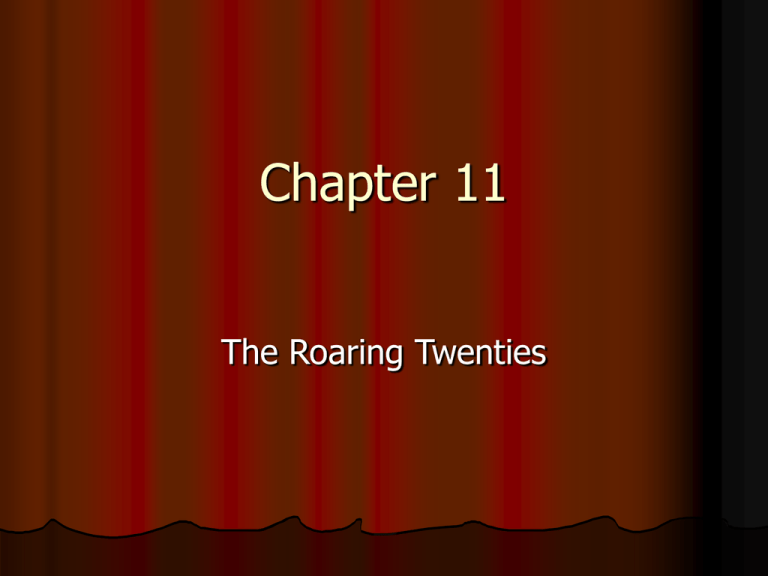
Chapter 11 The Roaring Twenties Section 1 The Red Scare -In 1920, Warren G. Harding wins presidency. -Wanted Americans to return to “Normalcy” -Many factors caused the U.S. people to have anything but “normalcy.” Reason #1 Russian Revolution -March 1917 Czar Nicholas II abdicates. -Lenin and Bolsheviks take over. -Caused a civil war [“Reds” vs. “Whites”] -Lenin and “Reds” win in 1920. -Creates new country called The Union of Soviet Socialist Republic [USSR] -Made Communism the official form of government. -Communism had 4 basic ideas: 1. Govt. owned all land and property 2. One political party [Communist] 3. No individual rights 4. Spread Communism over world -Communists hated U.S. b/c of our rights. -Caused a Red Scare in U.S. -Intense fear & hatred of Communists. -Caused many American Communists to be jailed or deported. Reason #2 • • • • • Schenck vs. U.S. -U.S. Supreme Court ruling -Sets up the “Clear and Present Danger Clause” -Anything that presents a danger to the nation or a person is not protected under free speech and the 1st Amendment. -Ex. Yelling fire in a crowded movie theater Reason #3 Palmer Raids -U.S. Attorney General A. Mitchell Palmer created a govt. groups to arrest suspected subversives. -People trying to overthrow the government -Most were Communists -Palmer jailed and deported thousands -Majority of them were innocent -Palmer’s groups were led by J. Edgar Hoover, Director of the FBI Warren G. Harding -Harding becomes Pres. at end of Red Scare. -Makes Herbert Hoover Sec. of Commerce. -Had 3 major goals: 1. Isolationism -Wanted to again follow Isolationism 2. Disarmament -Policy that nations would give up their weapons 3. Limiting Immigration -B/c of the Red Scare, the nation became more nativist. -Hatred of foreigners -Most Americans blamed all the U.S. problems on immigrants -To slow immigration, Harding set up an immigration quota. -Numerical limit Immigration was limited to 3% or about 350,000 per year. Teapot Dome Scandal -Harding dies before a major scandal appears. (Murder? Suicide? Natural Causes?) -Teapot Dome Scandal -Harding and his Secretary of the Interior, Albert Fall, lease Govt. oil fields in Wyoming and California to private oil companies -Albert Fall receives about $400,000 in exchange for helping the lease go through. -Fall is caught and goes to jail. -”The Fall Guy” Calvin Coolidge Calvin Coolidge ► -Coolidge takes over for Harding after his death. ► -Wins re-election in 1924.”Keep it Cool with Coolidge” ► -Major believer in U.S. business. ► -Follows a policy called Laissez Faire. ► -Govt. will stay out of business ► -Also continues Isolationism. ► -Helps to pass Kellog-Braind Pact ► -Nations agree not to use threats of war against each other. ► -Pact to prevent another world war. ► -Coolidge decides not to run in 1928. ► -Herbert Hoover runs in his place ► -Wins 1928 election ► Section 2 Consumer Economy -1st shopping mall and 1st fast food restaurant open in 1920’s. -1st fast food restaurant is A&W Root Beer -Main growth caused by consumer economy -Large amounts of buying by public. Credit Consumer economy helped U.S. grow b/c of installment plan -Paying for a product over time -Credit -Major items bought on credit: Cars Furniture Vacuums Radios Refrigerators Electricity Lights up the 1920s Electricity use grew b/c of buying on credit. -Jumped from 16% to 60% of homes with electricity -Major producer of electric goods was General Electric -Also provided new products for families: Electric toasters Electric coffee pots Electric ovens Electric Irons Electric sewing machines Electrical Goods of 1920s Henry Ford and the Model-T Henry Ford -1920’s saw the 1st mass-market cars. -1st affordable U.S. car builder was Henry Ford -His 1st attempt at a car was called “Quadricycle” -By 1903, built his own car company -1908 creates his 1st car for sale -Called Model-T -Came in one color [Black] -Built using Assembly Line -One person does a specific job in building a product. Model T Assembly Line Assembly Line General Motors -Ford’s major competitor was General Motors -G.M.’s major car was the Chevrolet -Offered cars in many colors -Ford countered G.M. in 1928 with the Model-A GM’s Chevrolet Ford’s Model A Section 3 New Women -1920’s saw birth of new thinking. -Biggest change came to women -Young women of the 1920’s were called Flappers -Young women who went against society and old-fashioned ideas. -Women also worked for voting rights. -19th Amendment gives women right to vote in 1920 Flappers Cities and Migration ► -Cities and rural areas had many Demographic Changes -Stats that describe a city -Age, Race, Income ► -Major changes came b/c of Great Migration -Movement of African Americans from rural south to cities in north ► -Another major growth came to suburbs -Areas within driving distance to major cities. -Suburbs grew for 2 reasons: ► 1. Cars ► 2. More Money to buy homes ► -Both allowed people to move out of cities but still work there ► American Heroes • • • • • -1920’s saw America’s fascination with heroes -4 major heroes of 1920’s 1. Charles Lindbergh -May 20, 1927 -25 year old “Lucky Lindy” flies his plane, “The Spirit of St. Louis” nonstop from NY to Paris • -Flight takes 33 1/2 hours • -1st nonstop flight across Atlantic • -Receives Congressional Medal of Honor Lindbergh and Spirit of St. Louis Amelia Earhart -Repeats Lindbergh’s flight in 1932 -Also flies from California to Hawaii -Tries to fly around world but disappears Jack Dempsey -Boxing champ of the world 1919-1926 -First fight to sell $1 million worth of tickets Babe Ruth -George Herman Ruth -NY Yankee great -Sets Home Run record with 60 in 1927 -Isn’t broken until 1961(Roger Maris) Had more home runs than all but 3 teams in the league combined. Today that would be hitting more than 124 in a season. -Considered one of the greatest players ever Babe Ruth Pictures Mass Media -1920’s saw a growth of Hollywood -Also saw growth of mass media – -Using print, radio, and TV to provide info to a large # of people -TV in 1950’s -Cell Phones and Internet today Movies -1st movies began in 1890’s -During 1920’s about 90 million people watched movies a week -U.S. population only 125 million at the time -1927 the 1st talking motion picture was released -Called “The Jazz Singer’ Newspapers More and more people were reading newspapers Biggest newspaper chain was owned by William Randolph Hearst [Citizen Kane] Biggest papers: New York Times San Francisco Examiner New York Journal Examiner and Journal owned by Hearst Radio 1st radio station was KDKA in Pittsburgh -Growth of new music in 1920’s -Influenced by African Americans -Called Jazz -2/3 of all radio stations in 1920’s were playing Jazz -Major Jazz musician was Duke Ellington -Major Jazz clubs were the Cotton Club and the Saratoga club, located in Harlem part of NYC -1920’s became known as the Jazz Age Harlem Renaissance -Harlem is a section of NYC -In 1920’s Harlem became center of culture -Especially for African Americans -Became known as Harlem Renaissance -2 major writers of the Harlem Renaissance: James Weldon Johnson Alain Lockes -Harlem became the social and cultural place to be in the U.S. during Jazz Age Lost Generation -Youth and writers of the 1920’s were called the Lost Generation -2 famous writers of the Lost Generation F. Scott Fitzgerald [The Great Gatsby] Ernest Hemingway [The Sun Also Rises] Ernest Hemingway F. Scott Fitzgerald Prohibition -18th Amendment becomes law on January 16, 1920 -Makes alcohol illegal -To enforce the amendment, the govt. uses the Volstead Act -Anything with 1/2 of 1% of alcohol was illegal -Internal Revenue Service [IRS] enforced act The Mafia -18th Amendment created new criminals in 1920’s -Most people got their alcohol from bootleggers -Suppliers of illegal alcohol -Illegal alcohol was sold in speakeasies -Secret bars during prohibition -Biggest and most powerful bootleggers and speakeasies were controlled by organized crime [Mafia] -NYC & Chicago were centers for the Mob Al Capone -Most famous gangster of the 1920’s was Al Capone -Scarface -Made $60 million from bootlegging The Untouchables Al Capone is finally brought down by special FBI/Treasury Dept. group called the Untouchables. Group was led by Elliott Ness -Capone was convicted of tax evasion in 1931 and sent to Alcatraz Elliott Ness The Untouchables Charles “Lucky” Luciano Most famous gangster in NYC Created the “Commission” The Commission was made up of the heads of NYC five mafia families. The Commission would meet to discuss problems and work to prevent a mob war. Luciano was the head of the Commission and leader of the US heroin trade Luciano is deported in 1946 to Italy. Lucky Luciano New York’s “Five Families” of the Mafia The Bonano or Bonnano Family The Columbo Family The Genovese Family The Gambino Family (John Gotti) The Lucchese Family Scopes Trial -John T. Scopes was arrested in Dayton TN. for teaching Charles Darwin’s Theory of Evolution – -Man evolved over time from other species [Not Apes] -Illegal in TN. public schools to teach anything but Creationism – -God created man and Earth -Scopes represented by Clarence Darrow -Tried by William Jennings Bryan -Found guilty and fined $100 -1st trial broadcast on radio -Split the entire nation on ideas of religion and science Racial Tensions Summer of 1919 saw huge violence against African Americans -The bloodiest was in Chicago -Called “Red Summer” The Ku Klux Klan The Great Migration and racism allowed an old group to gain power again. 1915 William Simmons revives the KKK -Group was destroyed earlier by President U.S. Grant -By 1924, 4 million new members -Began to show up in northern states as well -Carried out crimes against blacks, Jews, Catholics, and immigrants -KKK marched on D.C. with 100,000 -KKK took control of 6 state govts. -Lost power and major support in 1927
